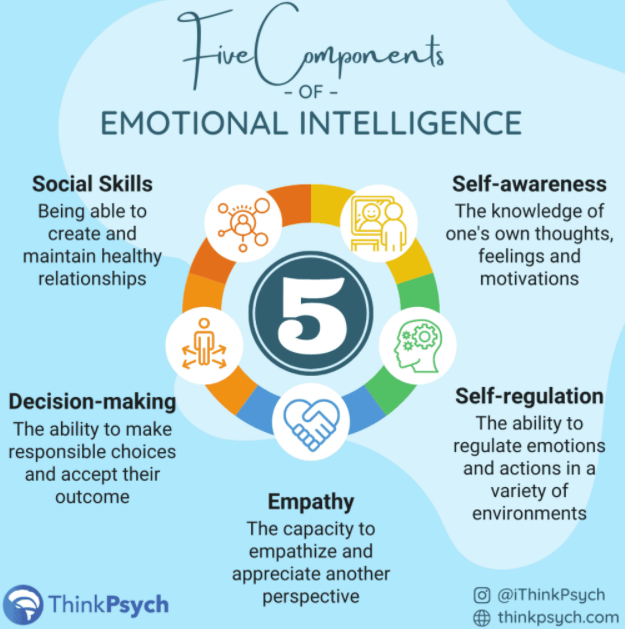Emotional Intelligence Benefits: 10 Reasons to Cultivate Your EI
Harness Emotional Intelligence Benefits Like a Pro:
|
|
|
Emotional intelligence (EI or EQ when it comes to testing) is often overlooked by many of
us – myself included. What is emotional
intelligence?
According to Wikipedia, EI is “the ability to perceive, use, imagine, understand, manage, and handle one’s emotions. People with high emotional intelligence can recognize their own emotions and those of others, use emotional information to guide thinking and behavior, discern between different feelings and label them appropriately, and adjust emotions to adapt to environments.” I think I forgot to breathe while typing all of this.
The concept was brought to the forefront by Daniel Goleman who wrote Emotional Intelligence: Why It Can Matter More Than IQ. He broke it down into 5 factors: Self- Awareness, Self-Regulation, Motivation, Empathy, and Social Skills.
Emotional Intelligence: What is it?
1. Self-Awareness: the ability to recognize strengths, weaknesses, personality and other characteristics. It took me a while to get a handle on this. I would just get angry at situations until I began identifying the anger was beginning. It sounds simple, but your awareness of anger can help you reduce and manage it. Having said that, it’s okay to get angry. The goal is to recognize the early signs which leads us to the next concept.
2. Self-Regulation: this is the ability to control or reduce our impulses so that we can better control a situation. This can be accomplished by channeling our negative/destructive feelings towards something healthier. After observing the start of my anger, I focused on the different license plates of fellow drivers instead of blasting laser beams from my eyes and destroying the car that cut me off.
3. Motivation: the ability to keep going in order to overcome challenges such as feeling defeated. Those who have mastered this share a common trait: the ability to be emotionally connected to a particular purpose. My passion is to help educate others on mental illness. Sometimes I feel deflated and don’t want to work on this. It’s at this very moment when I remind myself why I do what I do.
4. Empathy: this allows you to feel the pain of others and to understand their opinions and feelings. You don’t have to agree with these viewpoints, but it provides an opportunity to see things the way others see them. A different perspective from ours is an effective form of education. Empathy strengthens us.
5. Social Skills: This is the ability to build rapport with others in various social settings – especially with people you don’t know. I’m terrible at this. I hate small talk and avoid these situations at all costs. But that’s the problem – there is a cost. I cannot grow as a human being if I don’t confront my fear. Sometimes these situations involve difficult conversations; it’s important to let the other person know that you share their concern and want to be there for them – not judge them.
I hope you find this information helpful and begin focusing on improving and developing your emotional intelligence. I assure you your emotional intelligence benefits will add richness and peace to your life. It has done so for me. ~Ted
Emotional Intelligence Benefits: 10 Reasons to Cultivate Your EI ~parts adapted via Dialogueworks.com
|
1. Self-Awareness—Emotional intelligence benefits introspection. People with high EQ understand themselves more deeply. They realize what is important to them and are committed to their own growth and development. They are open to feedback that will help them improve. They are also more aware and sensitive to the feelings of others. |
2. Communication—Emotional intelligence benefits communication style. People with high emotional intelligence recognize the importance of communicating clearly and respectfully. They are able to stay calm in the face of highly emotional reactions of others. They know how to defuse defensiveness and to discover the underlying causes of a person’s emotional reactions. This allows them to influence others, to solve problems more effectively, and to maintain the quality of their relationships.
3. Leadership—Emotionally intelligent leaders are able to control themselves, their emotions, thoughts, and actions in a positive manner. Their self-control helps them to behave consistently as they influence and connect with those that they manage. They build trust and work to maintain a positive culture and demeanor among members of their team.
4. Change— Implementing innovations and trying to adapt to needed change can become a source of frustration, anger, or a lack of empathy. Emotional intelligence benefits stress management, as well. People who are emotionally intelligent can manage the stress and anxiety that the challenges of change often present. Being able to manage a variety of tense situations helps to instill trust and confidence in others while helping them to more easily and confidently make progress in stressful times.
5. Teamwork— Working with others and their various viewpoints is never easy. Being able to share ideas openly and honestly helps team members increase respect for one another while learning to value differing points of view. Those who are emotionally intelligent don’t control or manipulate the team dynamic to get what they want. Rather, they work together to contribute solutions which are best for the business and the goals they are trying to achieve.
6. Culture— Cultivating an environment where everyone respects and trusts one another creates a culture of support and mutual benefit. This type of positive environment is enjoyable and rewarding for those who work together. Such a collaborative culture increases retention and establishes good will among company members and teams.
7. Compassion—Emotional intelligence benefits compassion and empathy for others. Knowing how to approach and connect with people aids understanding and builds respect. The ability to demonstrate empathy is key. Practicing empathy helps strengthen relationships, reduce stress and anxiety, and increase understanding in a time where meeting goals and deadlines is often valued more than people.
8. Motivation—Another of the emotional intelligence benefits is that people with higher EQ's are frequently optimistic and not easily derailed when facing a challenge. They are hard workers with a growth mindset and persevere in the face of obstacles. They are driven by a sense of ambition to be successful no matter what the situation and their energy is infectious. They focus on purpose and process when things get tough, rather than assigning blame to people and performance.
9. Productivity—Because people with high EQ know how to appropriately deal with conflict and differing values, they are not derailed by others’ negative or “hot” emotions. They can manage themselves and know how to help others reclaim their rationality during heated exchanges. Their skills help them to solve problems and manage conflict more efficiently. Consequently, they are more productive in their work behavior and enable others to do the same.
10. Relationships—One of the most important emotional intelligence benefits is the quality of relationships. The quality of our relationships has a direct impact on the respect we have for one another, as well as the quality of results we are able to achieve. Knowing how to build and maintain effective relationships is one key to effectively working with others. People with high EQ do not take the negative emotional reactions of others personally. Instead, they seek to understand the source of others’ feelings and the values that are important to others. This allows them to effectively engage rather than avoid those who might react more emotionally in the workplace.
These are only a few of the emotional intelligence benefits. So what’s the good news about EQ? The skills for becoming more emotionally intelligent may be learned and used to become more effective as a person and as a leader. Your increased EQ will not only help you manage your work and personal relationships, but will also improve your ability to lead and manage others more effectively.




